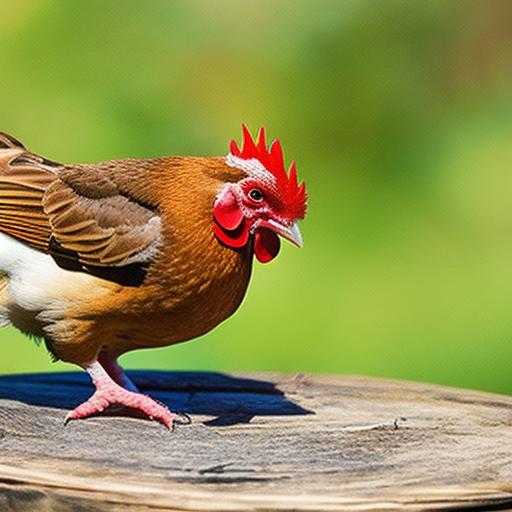Chickens have been domesticated for thousands of years, with the earliest evidence of their domestication dating back to around 6000 BC in Southeast Asia. Over time, chickens have become one of the most common and popular livestock animals around the world. People raise chickens for various reasons, including a steady supply of fresh eggs, natural pest control, fertilizer for gardens, and even as educational opportunities for children.
Key Takeaways
- Raising chickens can be a rewarding and sustainable hobby for many people.
- Keeping chickens can provide benefits such as fresh eggs, natural pest control, and fertilizer for gardens.
- When selecting a breed, consider factors such as egg production, temperament, and climate adaptability.
- A well-prepared chicken coop should provide adequate space, ventilation, and protection from predators.
- Proper feeding, watering, and health maintenance are essential for the well-being of your chickens.
Benefits of Keeping Chickens
One of the main benefits of raising chickens is the abundance of fresh eggs they provide. Not only are fresh eggs delicious, but they are also more nutritious compared to store-bought eggs. Chickens that are allowed to roam freely and eat a varied diet produce eggs that are higher in omega-3 fatty acids and vitamins A and E.
Chickens also serve as natural pest control in your backyard or garden. They love to eat insects, slugs, and other pests that can damage your plants. By allowing your chickens to free-range in your yard or garden, you can reduce the need for chemical pesticides and keep your plants healthy.
Another benefit of raising chickens is the fertilizer they produce. Chicken manure is rich in nitrogen, phosphorus, and potassium, making it an excellent natural fertilizer for gardens. By composting chicken manure and using it in your garden, you can improve soil fertility and promote healthy plant growth.
Raising chickens can also be a great educational opportunity for children. It teaches them responsibility, compassion, and the importance of sustainable living. Children can learn about the life cycle of chickens, how to care for them, and even participate in collecting eggs.
Selecting the Right Breed for Your Needs
When it comes to selecting the right breed of chicken for your needs, there are several factors to consider. First, you need to determine whether you want chickens primarily for egg-laying, meat production, or as pets. Different breeds are better suited for each purpose.
For egg-laying, some popular breeds include the Rhode Island Red, Leghorn, and Sussex. These breeds are known for their high egg production and consistent laying throughout the year. If you’re looking for chickens for meat production, breeds like the Cornish Cross and Plymouth Rock are commonly raised for their meat quality and fast growth rate.
If you’re interested in keeping chickens as pets, there are many friendly and docile breeds to choose from. Some popular pet breeds include the Silkie, Orpington, and Wyandotte. These breeds are known for their calm temperament and beautiful plumage.
Preparing a Chicken Coop
Before bringing home your chickens, it’s important to have a suitable chicken coop prepared. The coop should provide a safe and comfortable environment for your chickens to live in. When choosing a location for your coop, consider factors such as sunlight exposure, ventilation, and proximity to your house.
The size of the coop will depend on the number of chickens you plan to keep. As a general rule of thumb, each chicken should have at least 4 square feet of indoor space and 10 square feet of outdoor space. The coop should also have nesting boxes for egg-laying and perches for roosting.
When it comes to materials for constructing the coop, you can use a variety of options such as wood, metal, or plastic. Make sure the materials are sturdy and predator-proof. It’s also important to check with your local authorities regarding any permits or regulations that may be required for keeping chickens.
Chicken Coop Design and Features
When designing your chicken coop, there are several basic elements to consider. The coop should have proper ventilation to prevent moisture buildup and ensure good air circulation. It should also have windows or vents that can be opened or closed depending on the weather.
The coop should be well-insulated to provide warmth during colder months and shade during hotter months. You can use materials such as straw, wood shavings, or even recycled denim insulation to insulate the walls and roof of the coop.
Optional features for comfort and convenience include a run or outdoor enclosure for your chickens to roam, a dust bath area for them to clean themselves, and a secure storage area for feed and supplies. You can also add windows with wire mesh for natural light and predator-proofing.
Speaking of predator-proofing, it’s important to take measures to protect your chickens from predators such as raccoons, foxes, and hawks. This can be done by installing sturdy fencing around the coop and run, burying wire mesh underground to prevent digging, and using secure latches on doors and windows.
Feeding and Watering Your Chickens

Proper nutrition is essential for the health and well-being of your chickens. They require a balanced diet that includes a combination of grains, protein, vitamins, and minerals. Commercial chicken feed is readily available and formulated to meet their nutritional needs.
In addition to chicken feed, you can supplement their diet with kitchen scraps, fruits, vegetables, and even insects. Just make sure to avoid feeding them anything toxic or harmful, such as chocolate, onions, or avocado.
Water is also crucial for chickens’ health. They should have access to clean and fresh water at all times. You can use a traditional waterer or invest in automatic watering systems that provide a continuous supply of water.
It’s important to regularly clean and maintain the feeding and watering equipment to prevent the growth of bacteria or mold. Replace the water daily and clean the feeders regularly to ensure your chickens have access to clean food and water.
Proper Chicken Care and Health Maintenance
Caring for chickens involves daily routines such as checking on their food and water supply, collecting eggs, cleaning the coop, and monitoring their health. It’s important to establish a routine and stick to it to ensure the well-being of your chickens.
Regularly inspect your chickens for any signs of illness or injury. Common signs of illness include lethargy, loss of appetite, abnormal droppings, and changes in behavior. If you notice any of these signs, it’s important to consult a veterinarian who specializes in poultry health.
Preventing disease is key to maintaining the health of your flock. This can be done by practicing good biosecurity measures, such as keeping the coop clean and dry, quarantining new chickens before introducing them to the flock, and regularly disinfecting equipment and tools.
Common health issues in chickens include respiratory infections, parasites, and egg-laying problems. Respiratory infections can be caused by bacteria or viruses and can be treated with antibiotics or supportive care. Parasites such as mites or worms can be prevented or treated with appropriate medications. Egg-laying problems can be caused by various factors such as stress, age, or nutritional deficiencies, and may require adjustments to their environment or diet.
Collecting and Storing Eggs
Collecting eggs is one of the most rewarding aspects of raising chickens. To ensure the freshness and quality of the eggs, it’s important to follow some best practices. Collect eggs daily to prevent them from getting dirty or damaged. Handle them gently to avoid cracking or breaking.
If the eggs are dirty, you can gently wipe them with a dry cloth or use sandpaper to remove any stubborn stains. Avoid washing the eggs with water unless absolutely necessary, as this can remove the protective bloom on the shell and increase the risk of bacterial contamination.
To store eggs for freshness, it’s best to keep them in a cool and dry place. You can use an egg carton or a dedicated egg storage container. Make sure to store them with the pointed end down to help maintain their freshness.
If you find yourself with an excess of eggs, there are many creative ways to use them. You can bake cakes, cookies, or quiches, make omelets or frittatas, or even preserve them by pickling or making homemade mayonnaise. The possibilities are endless!
Dealing with Common Chicken Problems
Raising chickens comes with its fair share of challenges, including dealing with predators, addressing behavioral issues, and troubleshooting egg-laying problems.
Predators such as raccoons, foxes, and snakes can pose a threat to your chickens. To protect them, make sure the coop and run are secure and predator-proof. Use sturdy fencing, bury wire mesh underground, and install secure latches on doors and windows.
Behavioral issues in chickens can include aggression, feather pecking, or egg-eating. These behaviors can be caused by various factors such as overcrowding, boredom, or nutritional deficiencies. Providing enough space, enrichment activities, and a balanced diet can help address these issues.
Egg-laying problems can range from low egg production to soft-shelled or misshapen eggs. Factors such as age, stress, lighting conditions, or nutritional imbalances can affect egg production. Ensuring a comfortable and stress-free environment, providing a balanced diet, and maintaining proper lighting can help address these issues.
Conclusion and Additional Resources
Raising chickens can be a rewarding and fulfilling experience. Not only do they provide fresh eggs, natural pest control, and fertilizer for your garden, but they also offer educational opportunities for children. By selecting the right breed for your needs, preparing a suitable chicken coop, providing proper nutrition and care, and addressing common chicken problems, you can enjoy the benefits of raising chickens.
If you’re interested in learning more about raising chickens, there are many resources available online and in books. Websites such as Backyard Chickens and The Chicken Chick offer a wealth of information on various aspects of chicken care and management. Books like “Storey’s Guide to Raising Chickens” by Gail Damerow and “The Joy of Keeping Chickens” by Jennifer Megyesi provide comprehensive guides for beginners and experienced chicken keepers alike.
So why not consider starting your own flock of chickens? With the right knowledge and preparation, you can enjoy the many benefits that come with raising these fascinating and useful animals.
If you’re interested in learning more about keeping chickens, you’ll definitely want to check out this informative article on Poultry Wizard’s website. It provides a basic guide to keeping chickens and covers everything from choosing the right kind of coop for your feathered friends to the benefits of renting a chicken coop. For those concerned about keeping their chickens warm during colder months, the article also offers insights into selecting the best heater for a chicken coop. To delve deeper into these topics, click here: https://poultrywizard.com/keeping-chickens/what-kind-of-coop-is-best-for-chickens/, https://poultrywizard.com/keeping-chickens/rent-a-chicken-coop/, https://poultrywizard.com/keeping-chickens/heater-for-a-chicken-coop/. Happy chicken-keeping!
FAQs
What are the benefits of keeping chickens?
Keeping chickens can provide a source of fresh eggs, fertilizer for gardens, and entertainment. They also help control pests and weeds in the yard.
What do chickens need to be healthy?
Chickens need access to clean water, a balanced diet of feed, and a safe and comfortable living space. They also need protection from predators and regular health check-ups.
What kind of housing do chickens need?
Chickens need a coop that is dry, well-ventilated, and secure from predators. The coop should also have nesting boxes for laying eggs and perches for roosting.
What should I feed my chickens?
Chickens need a balanced diet of commercial feed that includes protein, carbohydrates, vitamins, and minerals. They also enjoy treats such as fruits, vegetables, and grains.
How often do I need to clean the coop?
The coop should be cleaned at least once a week to prevent the buildup of bacteria and parasites. The bedding should be replaced and the coop should be disinfected regularly.
What are some common health issues for chickens?
Common health issues for chickens include respiratory infections, parasites, and egg-laying problems. Regular health check-ups and proper nutrition can help prevent these issues.
Do I need a rooster to get eggs?
No, a rooster is not necessary for hens to lay eggs. However, if you want fertilized eggs to hatch into chicks, a rooster is necessary.
Meet Walter, the feathered-friend fanatic of Florida! Nestled in the sunshine state, Walter struts through life with his feathered companions, clucking his way to happiness. With a coop that’s fancier than a five-star hotel, he’s the Don Juan of the chicken world. When he’s not teaching his hens to do the cha-cha, you’ll find him in a heated debate with his prized rooster, Sir Clucks-a-Lot. Walter’s poultry passion is no yolk; he’s the sunny-side-up guy you never knew you needed in your flock of friends!







